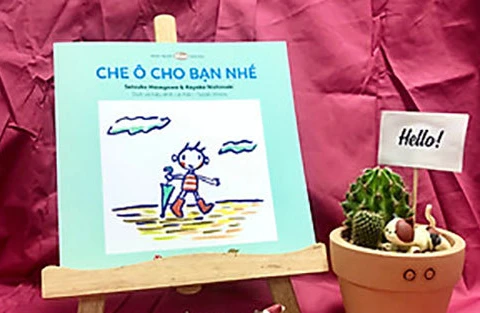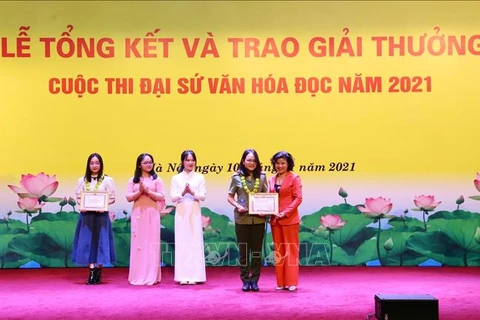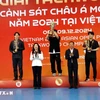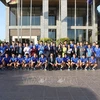Hanoi (VNA) – Language is an important and precious asset and a pride of any nation in the world. February 21 has been designated as the International Mother Language Da which UNESCO member states celebrate to promote linguistic diversity, culture, and multilingualism.
In Vietnam, the Vietnamese language has always affirmed its strong vitality, inherent richness, and beauty throughout the country’s history of ups and downs.
The beauty of the language
During the New Poetry movement (1932-1945), in the context that the country was not yet independent, the works by most of the contemporary poets at that time were entangled with an overwhelming sadness.
Literary critic Hoai Thanh said: "That tragedy they [poets] sent in Vietnamese. They love the language that, for centuries, has shared joys and sorrows with their past generations. They put their love for their homeland in their love for the Vietnamese language. They compare the language to the silk that carried the souls of past generations. They, in turn, also want to use it to convey their concerns.” (“An Age in Poetry”).
During Vietnam’s resistance war against the US, the love of the Vietnamese language was revealed passionately on the pages of Vietnamese writers. For example, in an essay “Ve tieng ta” (About our language) written in 1966 by writer Nguyen Tuan, he gave many examples to demonstrate the beauty, richness, and sophistication of the Vietnamese language such as expressions about death, genetics, or different meanings of a verse in classic works like "Chinh phu ngam" (Lament of the soldier's wife) or "Truyen Kieu" (The Tale of Kieu).
 In Vietnam, the Vietnamese language has always affirmed its strong vitality, inherent richness, and beauty throughout the country’s history of ups and downs. (Photo: VietnamPlus)
In Vietnam, the Vietnamese language has always affirmed its strong vitality, inherent richness, and beauty throughout the country’s history of ups and downs. (Photo: VietnamPlus) Nguyen Tuan said that he is grateful for the language he inherited, the one he speaks from the moment of birth until his last breath on earth.
After April 30, 1975, when when the North and the South of the country were reunified, the love for the Vietnamese language continued to flow in many poems of modern Vietnamese poetry.
Composed in the early 1980s, the poem "Tieng Viet" (Vietnamese language) by Luu Quang Vu has 60 verses and is like an epic story about the Vietnamese language.
The voice of the homeland, of generations in turn appears through the lines of poetry. It’s a mother’s voice calling in the dark smoky sunset to the sound of people struggling in hauling timbers. It’s a call for a boat on a deserted river to the heartbreaking sound of silk tearing, from the rushing flood to the words of a father.
More deeply, Luu Quang Vu used Vietnamese to awaken people to return to their roots, awakening the healing of people still on the other side of the front line. Is it true that the further someone is away from home, the more they miss their mother tongue. Overcoming all geographical and political barriers, the poet believes that all Vietnamese people can return to reunite as they share the same mother tongue.
Speaking at the 3rd congress of the Vietnam Journalists Association on September 8, 1962, President Ho Chi Minh said that language is an extremely long-lasting and precious asset of the nation. People must preserve it, cherish it, and make it more and more popular.
Before the August Revolution in 1945, in the "Outline of Vietnamese Culture" issued in 1943, the Communist Party of Vietnam identified the need to unify and enrich the language of the Vietnamese people.
After the revolution, when Vietnam’s resistance war against the French colonialists was at its most difficult time, Party General Secretary Truong Chinh called on people to join a movement to promote the Vietnamese and resolutely protect the mother tongue.
Since the beginning of 1966, after Prime Minister Pham Van Dong's speech on "Preserving the purity of the Vietnamese language", this issue has received more attention, and not just in the linguists’ circle.
The August Revolution ushered in a new development phase for the Vietnamese language as it was elevated to the status of an official language of a State. For the first time in history, the scope and use of the Vietnamese language has been infinitely expanded.
However, observing the use of the Vietnamese in daily life today, many people are concerned about the careless use not only in informal communication but also in written formal documents and newspapers.
The Vietnamese language is being distorted due to the creation or translation of new words, and inaccurate new terms.
People prefer to use English words despite there being equivalence in Vietnamese such as start-up, test kit, or smartphone.
In some cases, Vietnamese words and English words are mixed based on homonyms. For example, “Thu Hai” (Monday) is written “Thu high”, “Thu ba” (Tuesday) is written “Thu bar”. That is a way to distort the Vietnamese.
In the article "Preserving the purity of the Vietnamese language", Prime Minister Pham Van Dong emphasised: "Our language must develop. All that matters is how to ensure it develops sustainably, making it richer but still retaining its style, identity, and quintessence." Maintaining the purity of the Vietnamese language is always a topical issue./.




























